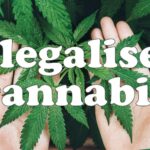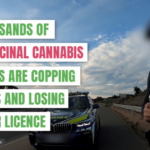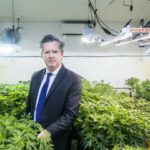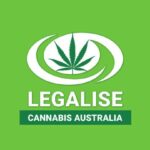The Legalise Cannabis Victoria Election Result Bodes Well for Genuine Law Reform
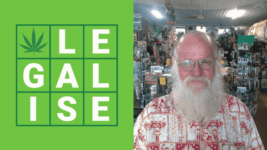
Right now, the prediction is that Legalise Cannabis Victoria may well take out three upper house seats in the Victorian state election.
Having secured two already, the party is waiting for the final count, but at present, it has garnered the most votes in the state after Labor, the Liberals and the Greens.
And whilst the party has been receiving rising support since the 2020 Queensland election, the result in last month’s Victorian election is being considered a major breakthrough for the decades-long campaign, as the potential for legalising cannabis in that jurisdiction is a tangible possibility.
Why this outcome is so significant is that the Andrews government needs support moving legislation through the Legislative Council, and Legalise Cannabis, the Greens, the Animal Justice Party and, hopefully, Reason’s Fiona Patten are to hold balance of power and they all support cannabis reform.
The Victorian Legalise vote comes on the back of May’s federal election, which saw at least 2 to 7 percent of votes in all jurisdictions across the nation go to Legalise Cannabis Australia, while the party took hold of two upper house seats in last year’s Western Australian state election.
The growing cannabis votes at ballot boxes around the nation has been raising eyebrows, but the initial reaction of surprise in seeing these results after a three-decade-long campaign is tempered once the general global trend towards legalisation of the plant is considered.
It’s inevitable
“It’s really exciting,” said Legalise Cannabis Australia president Michael Balderstone. “It’s been a long time coming and awareness has slowly grown on the back of America and Canada, South America and now Europe, all regulating cannabis. And with the stigma going, the public is just into it.”
“Slowly they’ve come to accept it’s an okay and safe thing, and on top of that, there’s the drug driving laws,” he told Sydney Criminal Lawyers. “Honestly, up here, people are disgusted by the driving laws.”
The global shift towards cannabis reform began with the US states of Colorado and Washington voting to legalise it in November 2012, which was followed by the entire nation of Uruguay in 2013.
Canada enacted legal cannabis laws nationwide in 2018, while adult use is now lawful in 21 US jurisdictions.
This shift to legalising the fairly innocuous plant commencing in the US is somewhat ironic though, as it was the US Federal Bureau of Narcotics, under Harry Anslinger in the 1930s, that instigated both local and global criminalisation of the plant, and it further made a concerted effort to demonise it.
“Big Pharma has taken over medical cannabis. You can only get it through your doctor, but it’s expensive”, Balderstone continued. “People are thinking that they could be growing a couple of plants in their backyard and realising it’s not this big scary drug that Reefer Madness portrayed.”
Howard era garbage
Legalise Cannabis Australia, formerly the HEMP Party, held its annual general meeting last Saturday in Nimbin, where it was decided that the party would adopt a new constitution and one of the two Legalise Cannabis WA MLCs, Dr Brian Walker, was voted to the position of national vice president.
“WA is different because Labor has such a majority, the premier can do what he likes,” explained Balderstone. “But it’s different for Dan who has got to get things passed through the upper house, and there will be a block of people supporting legalising cannabis, and maybe we can bend his arm.”
However, in the lead up to the election, Victorian premier Dan Andrews reiterated he isn’t in favour of cannabis reform, as he propagated some of the old myths about the herb, asserting that as “drug-induced psychosis is a really significant issue” for some, the plant is not safe to use at any levels.
“I’ve seen him muttering about mental health again, recently,” Balderstone added. “That was John Howard’s big spook about cannabis, which threatened a lot of parents. It’s very uncool. Dan needs to get real and get a bit of education going.”
The war on cannabis
Another key reform that Legalise Cannabis wants to see, Balderstone underscored, is that cannabis driving laws are revoked.
Under current systems nationwide, any level of the plant’s psychoactive component THC found in a driver’s system is captured, regardless of whether they’re stoned.
This means that police are issuing fines and licence suspensions on a daily basis to unimpaired drivers, including those with medicinal cannabis prescriptions. And while this assertion is uncontroversial, all jurisdictions, besides Tasmania, refuse to make any reform in this regard.
“The police know full well that it has nothing to do with impairment and they pick on us at MardiGrass. They pick on us on the road to Lismore,” Balderstone made clear. “It’s like shooting fish in a barrel doing drug testing around here.”
Legalise Cannabis is headquartered in the NSW Northern Rivers town of Nimbin. This region has been a flashpoint for NSW police roadside drug testing operations for close to a decade now. And despite the long-term widespread recognition that the system is flawed, it simply continues.
The green rush is coming
“The dream would be that Victoria changes the law. Then Labor gets elected in March in NSW and we can do something here as well,” the Legalise Cannabis Australia president said of the road ahead. “And if one or two states change, then the whole thing might roll through in Australia.”
Labor has been running a drug law reform agenda in the ACT since 2018, with the key support of the Greens. In January 2020, it became legal to use or possess a personal quantity of cannabis there, while the territory has only recently passed legislation to commence drug decriminalisation as well.
According to Balderstone, “there are only good consequences” to legalising the adult use cannabis, as it would free up police time, make it easier for those who may have an issue to seek help, and it would end the criminalisation of a significant sector of the community.
The National Drug Strategy Household Survey 2019 report outlines that 36 percent of Australians have used cannabis at one stage, and regarding regular use, the survey has long been finding that more than 10 percent of the community uses the plant recreationally over a 12 month period.
In terms of the NSW election next March, Balderstone said in conclusion, “We will definitely be having a go at an upper house seat, and if we get the same votes as we did in Victoria, we will get someone elected in NSW, and that would be great.”


